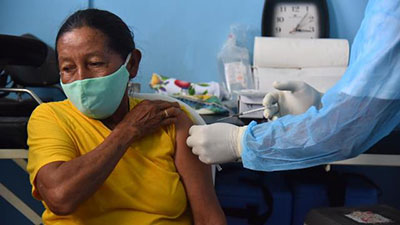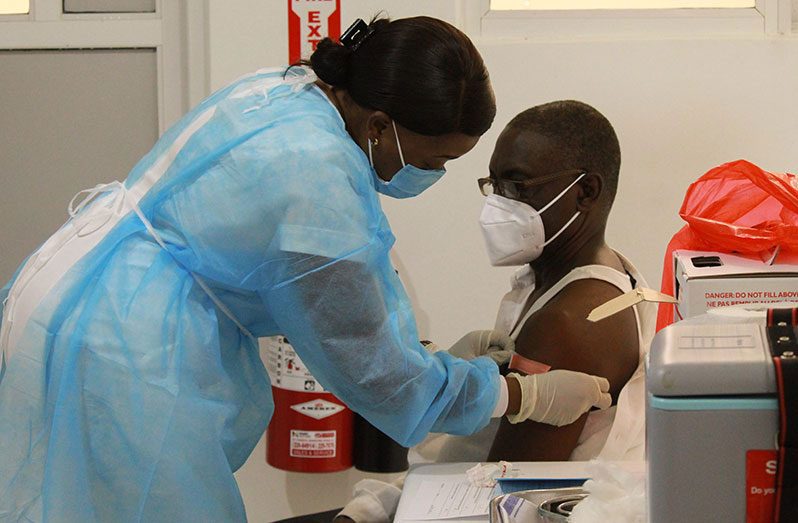…. Guyana moves apace with vaccination rollout
ON March 11, 2020, Guyana recorded its first case of COVID-19, and, unfortunately, ‘Patient Zero’, Ratna Baboolall, succumbed and became Guyana’s first COVID-19 death. Coincidentally, on that same day, the World Health Organisation (WHO) finally declared the spread of the novel coronavirus a ‘pandemic’.
During the weeks before this day, preparations started within the local health sector. The novel coronavirus had already begun infecting countries outside of Wuhan, China- where it, reportedly, originated. Still, like many countries around the world, the impact of the virus and the pandemic could not be fully understood.
“Guyana at the beginning of the pandemic, when it hit our shores in March last year, like many countries, we were not prepared. It’s not unique to Guyana; countries across the world were not prepared,” Head of Internal Medicine at the Georgetown Public Hospital Corporation (GPHC), Dr Mahendra Carpen, told the Guyana Chronicle in a recent interview.

With the pandemic declared and researchers dedicating their time and effort towards understanding the virus, new information was constantly emerging. Whether it was information on how the virus could be transmitted or which demographics were more at risk, the health sector was to adapt quickly.
Illustrating this, Dr. Carpen explained that in the earlier days of the pandemic, gastrointestinal symptoms were not recognised as part of the coronavirus infection. Nowadays, it is, despite widespread knowledge that COVID-19 is primarily a respiratory disease. And this is just one example.
“We have adjusted our protocols, across the world not just Guyana, and we have adjusted our protocols based on the knowledge we would have gained from this pandemic,” the Head of Internal Medicine said, explaining that health protocols have been evolving over the past year.
It is also important to note that Guyana was, uniquely, battling an epidemic of sorts simultaneously; that was the protracted electoral process following the March 2 elections.
Though Dr. Carpen acknowledged that there are no standard methods of determining what impact this protracted period had on the management of and behaviours towards the pandemic, he did contend that many persons were “distraught” and perhaps, not as focussed on COVID-19. By August 2, five months after Guyanese went to the polls and five months after COVID-19 spread to Guyana, President Dr. Irfaan Ali was sworn in.
In the months that followed, several steps were taken to ensure that the economy and society returned to some semblance of normalcy. Schools were partially reopened; restrictions were partially relaxed, allowing persons to return to work, and a suite of fiscal and monetary measures were introduced to spur economic activity.
Dr. Frank Anthony took over the post of Minister of Health. Thereafter, efforts were made to procure the relevant supplies and equipment needed to intensify testing and surveillance efforts.
MUTATED
By the end of 2020, however, scientists found that the Sars-Cov-2 had mutated and there was a new, concerning strain of the coronavirus- known as the B117 or ‘United Kingdom (UK) variant’. Subsequently, additional variants of concern were discovered in South Africa and Brazil.
Dr. Anthony explained that it is normal for viruses to mutate. Even so, it becomes worrisome when the mutations are related to an increased transmissibility of the virus. This means that more persons can become infected, thereby placing an additional burden on the health sector.
Guyana, without capacity to conduct the specific type of genetic analyses necessary for defining these strains could only take precautions — more so when the newer variant emerged just next door, in Brazil.
“The transmission really is by droplets or aerosols and so wearing a mask and keeping your distance helps to break transmission,” Dr. Anthony said, while adding: “But the other thing is if we are able to vaccinate the population, you are able to immunize to protect persons.”
Since February 11, amid growing concerns of the presence of variants, Guyana commenced its rollout of the COVID-19 vaccines. Vaccination began with the frontline health workers, who are at a higher risk of interacting with persons infected with COVID-19. Since then, in more recent weeks, elderly persons over the age of 60 and some other frontline workers (such as the joint services) have been receiving their ‘jabs’.
AMBITIOUS PLAN
Vaccination is also ongoing in all ten administrative regions. And Guyana has an ambitious plan of vaccinating a majority of its population by the end of 2021, despite the Economist’s projection that Guyana and other low-income countries would not achieve widespread coverage until 2023.
“It’s a race against these variants in a sense because some of the vaccines if we don’t get them quickly and administer them it can be that the virus mutates and prevents the vaccines from working as effectively as it should,” the Health Minister said and hastened to add, “Even with these different variants, however, vaccines work effectively.”
Dr. Carpen, who was one of the first persons to receive the Oxford-AstraZeneca vaccine from Guyana’s first tranche of vaccines, opined that the benefits of vaccines outweigh the risk of any potentially adverse side-effects. As such, while he acknowledged that there is great uncertainty about whether a vaccine will offer long-term protection, he encouraged each person to take it, once offered.
“I believe that if we are going to see the end of COVID-19 in the next couple of years, vaccination would mark the first major step in that direction. It may be that we continue to have COVID-19 infections, but because of the vaccinations we no longer have it as severe life threatening as it used to be in the early days,” the GPHC doctor explained.
Through Guyana’s vaccination rollout, there have been no adverse side-effects registered. The only side-effects recorded were associated with vaccines in general. That is, swelling and soreness at the site, headaches and fevers. Still, a pharmacovigilance committee has been formed to monitor the cases where there have been side-effects.
Meanwhile, Dr. Carpen has urged Guyanese not to lose sight of the other health problems Guyana has. “As much as our attention is now focussed on COVID-19, chronic Non-Communicable Diseases (NCDs) are still our number one cause of diseases and disability in this country,” Dr. Carpen said in a recent interview, emphasising: “Cardiovascular remains the number cause of death and disability or mortality or morbidity.”
In 2020, the Pan-American Health Organisation’s (PAHO)’s Non-Communicable Diseases (NCDs) progress monitor for Guyana stated that 4,400 deaths (or 68 per cent of all deaths) were caused by NCDs. This report was published in March 2020, which meant that this information was applicable to the year before. This, therefore, meant that the total number of deaths would have been approximately 6,471.
It is also important to note that persons with underlying diseases- other cardiovascular diseases, respiratory illnesses, diabetes or other NCDs- are increasingly vulnerable to the more severe effects of COVID-19. These underlying conditions are termed comorbidities.
“If we lose sight of all of the other things that can cause real problems as well, we’re going to end up with problems just like that where people are at home with chest pain, at home having a stroke and they don’t come to hospital or they come to hospital too late when too much damage is done or they miss their preventative health screening and follow up and clinic visits and so forth,” Dr. Carpen lamented.




.png)









